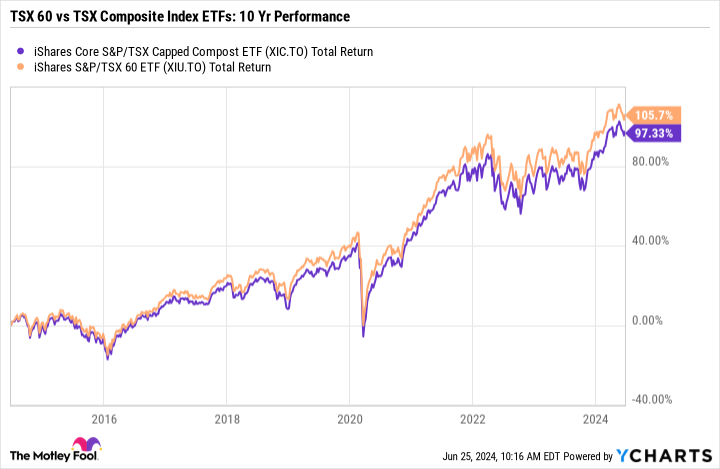60 Stocks Under $50 New Investors Can Buy Confidently

Written by Brian Paradza, CFA at The Motley Fool Canada
Investing in the Canadian stock market can seem daunting, especially for new investors. The sheer abundance of stock investing choices, complexities of market dynamics, and limitation of a small capital budget can be overwhelming. However, beginners can cheaply invest in a diversified portfolio that provides exposure to a broad range of top TSX stocks – at prices below $50 per share.
New investors can maximize their potential gains, earn recurring quarterly income through dividends, achieve instant portfolio diversification, and minimize potential capital losses on individual investments by buying shares in 60 of the largest TSX stocks through a popular Exchange-Traded Fund (ETF), the iShares S&P/TSX 60 Index ETF (TSX:XIU), which currently trades at prices around $33 a share.
Understanding the S&P/TSX 60 Index ETF: Canada’s large-cap stock investor’s friend
The iShares S&P/TSX 60 Index ETF is a low-cost medium-risk investment fund with a $12.2 billion portfolio designed to replicate the performance of the S&P/TSX 60 Index – a collection of Canada’s 60 leading companies. The ETF grants new investors diversified exposure to the performance of various Canadian economic sectors, including energy, finance, and technology, all in a single investment.
Large-cap stocks usually have tried-and-tested business models that have been successful over the past years, and decades. When you buy large-cap stocks, the chances of investing in a collapsing business are reasonably low. Canadian large-cap stocks, as evidenced by the XIU ETF’s 104% gain, significantly outperformed small-caps during the past decade. An investment in the iShares S&P/TSX SmallCap Index ETF, a proxy for Canadian small caps, generated about 40% in capital gains over the past 10 years. Perhaps the winners are taking all the lucrative business deals in the increasingly competitive global and local marketplaces.
Perhaps it’s its selective exposure to the top 60 Canadian stocks that, at times, grants the TSX 60 index an outperforming edge over a more crowded S&P/TSX Composite Index – a broader gauge of Canada’s stock market performance that welcomes some smaller eligible start-ups, including cannabis stocks, to enhance diversity. The iShares S&P/TSX 60 Index ETF outperformed the iShares S&P/TSX Capped Composite ETF over the past decade.
XIC Total Return Level data by YCharts
Why invest?
New investors may buy into the highly accessible, cheap, and affordable S&P/TSX 60 Index ETF at around $33 per share right now (time of writing). Anyone with a small investment budget can snag a decent number of shares and gain exposure to Canada’s top 60 large-cap stocks.
Investing in the XIU ETF, which has become one of Canada’s most popular investment funds for both individuals and institutional investors, affords investors a balanced and diversified investment, reduces the risks of investing in individual stocks, and removes the pressure of personally managing individual investments.
What’s more, investors receive quarterly dividends that currently yield a respectable 3.2% annually. The quarterly dividends could provide additional liquidity and capital to reinvest into more shares. The ETF has a dividend reinvestment plan (DRIP) in place that could help effortlessly automate the process.
Further, the XIU ETF’s dividend could be a powerful source of growth to a new investor’s portfolio. One could use the quarterly dividends to buy into the hottest (but potentially riskier) investment ideas of the day, should they desire, and gain more valuable investing experience.
The S&P/TSX 60 Index ETF could be held as a core holding in a retirement portfolio. New investors could add high-conviction stocks (and recommendations) around this core. The strategy helps individual investors feel good about their growing wealth as they consistently add new capital to new portfolios.
And consistency will be key to reaching intended investment objectives.
The post 60 Stocks Under $50 New Investors Can Buy Confidently appeared first on The Motley Fool Canada.
Should you invest $1,000 in iShares S&P/TSX 60 Index ETF right now?
Before you buy stock in iShares S&P/TSX 60 Index ETF, consider this:
The Motley Fool Stock Advisor Canada analyst team just identified what they believe are the 10 best stocks for investors to buy now… and iShares S&P/TSX 60 Index ETF wasn’t one of them. The 10 stocks that made the cut could potentially produce monster returns in the coming years.
Consider MercadoLibre, which we first recommended on January 8, 2014 ... if you invested $1,000 in the “eBay of Latin America” at the time of our recommendation, you’d have $16,110.59!*
Stock Advisor Canada provides investors with an easy-to-follow blueprint for success, including guidance on building a portfolio, regular updates from analysts, and two new stock picks each month – one from Canada and one from the U.S. The Stock Advisor Canada service has outperformed the return of S&P/TSX Composite Index by 29 percentage points since 2013*.
See the 10 stocks * Returns as of 6/20/24
More reading
Can You Guess the 10 Most Popular Canadian Stocks? (If You Own Them, You Might Be Losing Out.)
How to Build a Bulletproof Monthly Passive-Income Portfolio in 2024 With Just $25,000
Fool contributor Brian Paradza has no position in any of the stocks mentioned. The Motley Fool has no position in any of the stocks mentioned. The Motley Fool has a disclosure policy.
2024

 Yahoo Finance
Yahoo Finance 
